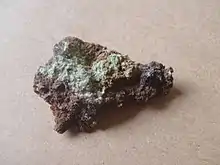Nickelblödite
Nickelblödite is a rare nickel sulfate mineral with the formula Na2Ni(SO4)2·4H2O.[1][3] Nickelblödite was discovered in nickel mines in Carr Boyd Rocks and Kambalda, Western Australia.[1] The mineral is a nickel-analogue of blödite, changoite, cobaltoblödite and manganoblödite - other representatives of the blödite group.[3]
| Nickelblödite | |
|---|---|
 A crust of greenish nickelblödite on gossan; obtained from dealer at the Minerant (mineral show of the MKA) 2016 | |
| General | |
| Category | Sulfate mineral |
| Formula (repeating unit) | Na2Ni(SO4)2·4H2O |
| Strunz classification | 7.CC.50 |
| Dana classification | 29.3.3.2 |
| Crystal system | Monoclinic |
| Crystal class | Prismatic (2/m) (same H-M symbol) |
| Space group | P21/a |
| Unit cell | a = 10.87, b = 8.07 c = 5.46 [Å]; β = 100.43°; Z = 2 |
| Identification | |
| Color | Pale yellowish-green to pale green |
| Crystal habit | Flat crystallites |
| Diaphaneity | Translucent |
| Specific gravity | 2.43 (calculated) |
| Optical properties | Biaxal (-) |
| Refractive index | nα=1.50-1.51, nβ=1.51-1.52, nγ=1.51-1.52 (approximated) |
| Common impurities | Mg, Fe |
| References | [1][2][3] |
Nickelblödite contains small admixtures of magnesium and iron.[2]
Minerals associating with nickelblödite include violarite, morenosite, halite, pyrite, and siderite.[2]
References
- Nickel, E.W., and Bridge, P.J., 1977. Nickelblödite, Na2Ni(SO4)2·4H2O, a new mineral from Western Australia. Mineralogical Magazine 41, 37-41
- "Nickelblödite - Handbook of Mineralogy" (PDF). Handbookofmineralogy.org. Retrieved 2016-03-11.
- "Nickelblödite: Nickelblödite mineral information and data". Mindat.org. Retrieved 2016-03-11.
This article is issued from Wikipedia. The text is licensed under Creative Commons - Attribution - Sharealike. Additional terms may apply for the media files.